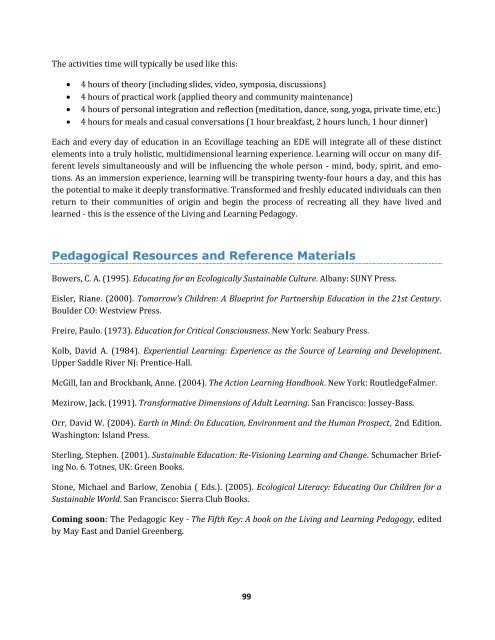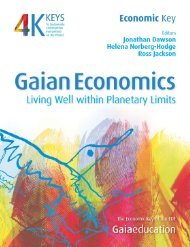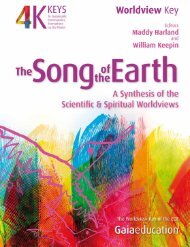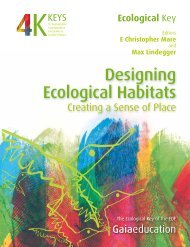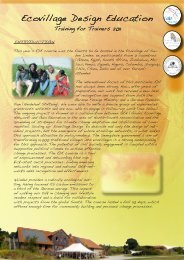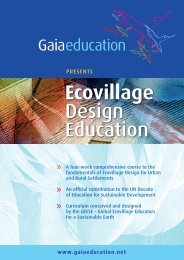EDE Curriculum 2012.pdf - Gaia Education
EDE Curriculum 2012.pdf - Gaia Education
EDE Curriculum 2012.pdf - Gaia Education
You also want an ePaper? Increase the reach of your titles
YUMPU automatically turns print PDFs into web optimized ePapers that Google loves.
The activities time will typically be used like this:<br />
� 4 hours of theory (including slides, video, symposia, discussions)<br />
� 4 hours of practical work (applied theory and community maintenance)<br />
� 4 hours of personal integration and reflection (meditation, dance, song, yoga, private time, etc.)<br />
� 4 hours for meals and casual conversations (1 hour breakfast, 2 hours lunch, 1 hour dinner)<br />
Each and every day of education in an Ecovillage teaching an <strong>EDE</strong> will integrate all of these distinct<br />
elements into a truly holistic, multidimensional learning experience. Learning will occur on many different<br />
levels simultaneously and will be influencing the whole person - mind, body, spirit, and emotions.<br />
As an immersion experience, learning will be transpiring twenty-four hours a day, and this has<br />
the potential to make it deeply transformative. Transformed and freshly educated individuals can then<br />
return to their communities of origin and begin the process of recreating all they have lived and<br />
learned - this is the essence of the Living and Learning Pedagogy.<br />
Pedagogical Resources and Reference Materials<br />
Bowers, C. A. (1995). Educating for an Ecologically Sustainable Culture. Albany: SUNY Press.<br />
Eisler, Riane. (2000). Tomorrow’s Children: A Blueprint for Partnership <strong>Education</strong> in the 21st Century.<br />
Boulder CO: Westview Press.<br />
Freire, Paulo. (1973). <strong>Education</strong> for Critical Consciousness. New York: Seabury Press.<br />
Kolb, David A. (1984). Experiential Learning: Experience as the Source of Learning and Development.<br />
Upper Saddle River NJ: Prentice-Hall.<br />
McGill, Ian and Brockbank, Anne. (2004). The Action Learning Handbook. New York: RoutledgeFalmer.<br />
Mezirow, Jack. (1991). Transformative Dimensions of Adult Learning. San Francisco: Jossey-Bass.<br />
Orr, David W. (2004). Earth in Mind: On <strong>Education</strong>, Environment and the Human Prospect, 2nd Edition.<br />
Washington: Island Press.<br />
Sterling, Stephen. (2001). Sustainable <strong>Education</strong>: Re-Visioning Learning and Change. Schumacher Briefing<br />
No. 6. Totnes, UK: Green Books.<br />
Stone, Michael and Barlow, Zenobia ( Eds.). (2005). Ecological Literacy: Educating Our Children for a<br />
Sustainable World. San Francisco: Sierra Club Books.<br />
Coming soon: The Pedagogic Key - The Fifth Key: A book on the Living and Learning Pedagogy, edited<br />
by May East and Daniel Greenberg.<br />
99


